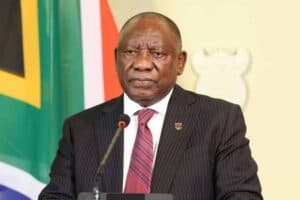Nuclear power is touted as the solution to South Africa's energy future despite concerns over cost and time.

As South Africa looks to secure its energy future, nuclear power is emerging as a compelling contender, offering a reliable and consistent source of electricity generation while helping the country reduce its reliance on fossil fuels, particularly coal, according to experts, although stakeholders have concerns.
Government’s announcement of the Section 34 determination to start the process to procure 2 500 megawatts of new nuclear capacity was met with criticism from various experts and environmental nongovernmental organisations, although others said it was “moving in the right direction”.
Sarah Mabunda, an energy policy analyst, said nuclear energy held promise as a crucial component of the country’s future.
ALSO READ: Deterioration of Eskom’s power plants ‘must be addressed’ – energy analysts
“By strategically incorporating nuclear power into its energy mix, South Africa can enhance energy security, reduce environmental impact and foster sustainable economic development,” she said.
For SA to move away from coal dependency, nuclear power remained the sole viable option and “is definitely a long-term energy security plan, not short-term”.
’10 years before you see anything’
“It will take about 10 years before you see anything on the grid and we all know it’s famous for time and cost overruns.
“Nuclear technology boasts the highest capacity factor and, considering its lifespan of up to 70 years, offers the most economically advantageous levelised cost of energy,” she said.
Princy Mthombeni, founder of Africa4Nuclear, said SA would not have a major load shedding crisis if the journey had not been extensive, “marked by legal battles and challenges, largely exacerbated by governmental inefficiency and opposition from antinuclear advocacy groups”.
“The world is realising that nuclear is good and nuclear will help solve the energy crisis we all face in the world,” she said.
“Look at the nuclear power plant, Koeberg near Cape Town, in operation and that is proof that nuclear works.
“I still say nuclear energy is the most valuable technology on this planet which can, and ultimately will, be the reason millions of Africans can live secure, healthy, happy and fulfilling lives.”
She said, like any other solution, every energy option had its challenges.
“Renewable sources like wind and solar face intermittent issues … while fossil fuels contribute to air pollution and greenhouse gas emissions, exacerbating climate change.”
“Nuclear energy grapples with safety concerns, high upfront costs and public resistance,” she added.
ALSO READ: Nuke plan leaves us in the dark
In October 2023, BirdLife SA reported birds from at least 200 species had fatal collisions with wind turbines in SA and that almost every wind farm in the country had recorded fatalities of threatened and priority species.
Samantha Ralston-Paton, the birds and renewable energy project manager at BirdLife South Africa, said the fatalities were recorded in other threatened and priority species, including the Verreaux’s eagle (classified as vulnerable), the martial eagle (classified as endangered), the Cape vulture (classified as vulnerable), and the secretary bird (classified as endangered).
The South African Bat Assessment Association said while bats had a sophisticated means of detecting their environment and orienting themselves – such as echolocation – there was also a concerning number of bat fatalities at wind turbines.
“This is because large turbine blades move too fast to allow bats to avoid collision.
“Bats may also be killed due to barotrauma [internal injuries due to decompression in the zone of low air pressure near moving blades],” the association said.
Energy analyst Chris Yelland said the business case for new nuclear power in the country was weak and 2 500MW would be useless by 2035.
He said it was expected to take 10 to 15 years to deliver a new nuclear power. “Therefore it is not a solution to our electricity needs”.
ALSO READ: Load shedding puts birds in danger
‘Not the right solution’
“But even beyond that, I do not think that it is the right solution for the country.
“Between now and 2035, when new nuclear power could theoretically come on stream, there is going to be built approximately 60 000MW of variable renewable energy,” he said.
“And what South Africa needs after 2035, when this 60 000MW will be constructed, is not 2500MW of steady power.
“What we really need is flexible generation that can be ramped up and down quickly to complement variable renewable energy.”
Yelland argued that while all options had challenges, “the kind of power we need should be flexible generation, which comes in the form of hydropower, pumped water storage, gas to power and battery energy storage”.
“Those are the flexible generation sources. What we don’t need are inflexible sources such as nuclear power and power from coal, because they cannot be adjusted and ramped up and down to complement the variability of renewable energy.
“It is proving to be unreliable, intermittent, dirty, unhealthy, and it uses a lot of water. Those are the very things we do not want.”






